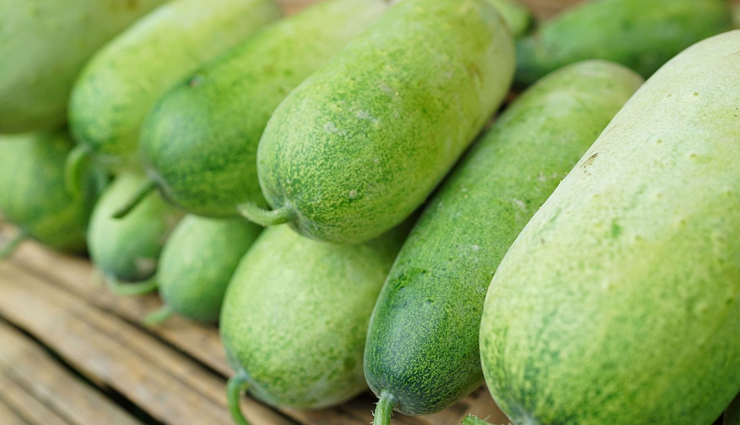- Home›
- Healthy Living›
- Winter Melon: Nutrition, Benefits, Side Effects, & Precautions
Winter Melon: Nutrition, Benefits, Side Effects, & Precautions
By: Priyanka Maheshwari Wed, 11 Oct 2023 11:08:20

Winter melon, scientifically known as Benincasa hispida and also referred to as downtime melon, wax gourd, white pumpkin, ash gourd, and Chinese watermelon, is a fruit native to Southern Asia. This fruit has gained attention due to its unique nutritional profile. With a high water content of 96%, winter melon is low in calories, fat, protein, and carbohydrates, making it an excellent choice for those looking to maintain a healthy diet. Despite its low caloric content, it is rich in fiber, promoting digestive health.
Winter melon is not only hydrating but also packed with essential nutrients. It contains significant amounts of vitamin C and is a good source of flavonoids and carotenoids, which have antioxidant properties. These antioxidants play a role in protecting the body against cell damage and may have benefits in managing conditions like type 2 diabetes.
To delve deeper into the nutritional aspects, benefits, various recipes, and potential side effects of winter melon, continue reading and explore the diverse ways this fruit can enhance your overall health.

What Is Winter Melon?
Winter melons, scientifically known as Benincasa hispida, are ancient fruits cultivated on trailing vines within the Cucurbitaceae family. These large fruits are native to Asia, prized both for their medicinal properties and culinary versatility due to their mild taste. Winter melons are recognized by various names globally, and the name "winter melon" might originate from the fine, white coating on the fruit resembling snow, according to some experts. Despite being botanically classified as fruits, they are typically cooked and consumed as vegetables, commonly featured in curries and stir-fries in Asian cuisines, including Indian and Chinese dishes.
Regarding their taste, the seeds, when cooked, offer a nutty and neutral flavor. Winter melons are not typically eaten raw; they possess a mild, subtly grassy taste. Cooking the melon renders its flesh transparent and soft, and prolonged cooking results in a mellower flavor.
Nutritionally, winter melons are dense in essential nutrients. For a detailed breakdown of the nutritional content of 100 grams of winter melon, please refer to the section below.
Water - 96.1 g
Energy - 13 kcal
Protein - 0.4 g
Carbohydrates - 3 g
Fibre - 2.9 g
Calcium - 19 mg
Vitamin C - 13 mg
Vitamin B2 - 1.3 mg
Magnesium - 10 mg
The nutritional composition of winter melons accounts for their numerous advantages. These benefits will be elaborated upon in the following section.
Health Benefits Of Winter Melons

# Potential Aid in Managing Type 2 Diabetes
Winter melons, being low in calories, are suitable for individuals focusing on weight management and those dealing with diabetes. Studies have indicated their ability to lower blood sugar levels in individuals with type 2 diabetes mellitus. Furthermore, vegetables from the Cucurbitaceae family, to which winter melons belong, provide valuable fibers, β-carotene (a precursor to vitamin A), potassium, and vitamin C. Regular consumption of these vegetables can contribute to the effective management of diabetes mellitus.
Additionally, ongoing research suggests that incorporating winter melon into one's diet may lead to a reduction in blood sugar levels among diabetes mellitus patients.

# Potential Reduction in Cancer Risk
Winter melon exhibits promise in diminishing the risk of various cancers. The biochemical components present in this fruit hinder the action of carcinogens and impede the spread of malignant cells. Furthermore, winter melon contains carotenoids that can lower the risk of colon cancer.
Moreover, extracts from winter melon seeds have demonstrated significant antioxidant properties. These antioxidants counteract the harmful effects of free radicals, which, if left unchecked, could elevate the risk of cancer. Notably, winter melon seeds are rich in polyunsaturated fatty acids, potentially further reducing the risk of developing cancer.

# Potential Benefits for Eye Health
The antioxidants found in winter melons play a crucial role in reducing oxidative stress within the retina. Additionally, as individuals age, the levels of vitamin C in the eye lens may decline, potentially leading to vision problems. Consuming fresh winter melons could help increase vitamin C levels in the lens, although the effectiveness of vitamin C as a cataract treatment remains inconclusive based on various studies.
Winter melons also contain riboflavin, a deficiency of which may result in night blindness. Maintaining an adequate intake of riboflavin can help prevent this condition.

# Potential Advantages for Skin Health
Winter melons serve as a abundant source of vitamin C and antioxidants, both of which are beneficial for skin health. Vitamin C, which winter melons are rich in, can be applied topically in dermatology to address changes associated with photoaging and hyperpigmentation. This nutrient protects the skin from oxidative stress; ascorbic acid, the biologically active form of vitamin C, is the skin's most abundant antioxidant. Moreover, vitamin C is known for its skin-brightening effects.

# Potential Support for Heart Health
Winter melons contribute to cardiovascular health due to their vitamin C content, which combats free radicals, thereby reducing cardiovascular issues. Antioxidants like vitamin C hinder the oxidation of LDL (low-density lipoprotein) and consequently lower the risk of cardiovascular diseases. Deficiency in vitamin C is linked to an elevated risk of cardiovascular conditions. Additionally, vitamin C might marginally enhance endothelial function, which pertains to the cellular tissue covering the heart and blood vessels.
Moreover, there is anecdotal evidence suggesting that winter melon juice could aid in cooling the body during the summer. However, it's important to note that further research is required to substantiate this claim.
These represent the key advantages associated with winter melons. Nevertheless, it's essential to explore their potential drawbacks, which will be discussed in the following section.
Side Effects And Allergic Reactions Of Winter Melons
Potential Cold Aggravation:
According to Ayurveda, winter melon possesses cooling properties. Anecdotal evidence suggests that this might exacerbate cold symptoms in certain individuals. Therefore, it's advisable to refrain from consuming winter melon when experiencing a cold and consult a healthcare professional.
Possible Gastrointestinal Discomfort:
Winter melon is rich in potassium. Excessive consumption may lead to gastrointestinal discomfort, including nausea, diarrhea, and abdominal pain. These side effects typically subside naturally with time. To enjoy its benefits, it is essential to consume winter melon in moderation.
How to Include Winter Melon in Your Diet:
Winter melon can be prepared in various ways, such as in stews, soups, stir-fries, and steamed dishes. Due to its neutral taste and ability to absorb flavors well, it is often paired with strongly seasoned ingredients like pork and fungi. Additionally, it can enhance the taste of salads and smoothies.
Selection and Storage:
When choosing a winter melon, opt for one without any bruises. Fresh winter melons are characterized by their green color and firm rinds. For storage, remove the seeds and the white inner part, then store the melon in a vegetable container in the refrigerator. It can be stored for up to 4 days, ensuring its freshness.
Explore delicious recipes featuring winter melon in the section below to add variety to your culinary endeavors.
Recipes

# Chinese Winter Melon Soup Recipe
Ingredients
1 pound (450g) winter melon, peeled, seeded, and cut into bite-sized pieces
1 medium-sized carrot, peeled and sliced
4 cups (1 liter) chicken or vegetable broth
1 teaspoon grated ginger
2 cloves garlic, minced
2-3 dried shiitake mushrooms, soaked in hot water and sliced
1/2 cup cooked chicken, shredded (optional)
2 green onions, chopped
Salt and pepper, to taste
1 tablespoon vegetable oil
1 teaspoon sesame oil (optional)
Fresh cilantro leaves for garnish
Method
- Peel the winter melon, remove the seeds, and cut it into bite-sized pieces. If you prefer a softer texture, you can peel the skin; otherwise, you can leave it on for added texture.
- Soak the dried shiitake mushrooms in hot water for about 20-30 minutes until they are soft. Squeeze out any excess water and slice them thinly.
- In a large pot, heat the vegetable oil over medium heat. Add the grated ginger and minced garlic. Sauté for a minute or until fragrant.
- Add the winter melon and sliced carrots to the pot. Stir and cook for 2-3 minutes.
- Pour in the chicken or vegetable broth. Bring the soup to a boil, then reduce the heat and let it simmer for about 15-20 minutes or until the winter melon and carrots are tender.
- Add salt and pepper to taste. If you're using cooked chicken, add it to the soup at this point.
- Add the sliced shiitake mushrooms to the pot and let the soup simmer for an additional 5 minutes.
- Stir in the chopped green onions and sesame oil (if using). Adjust the seasoning if necessary.
- Ladle the soup into bowls. Garnish with fresh cilantro leaves and additional green onions if desired.

# Ash Gourd Curry
Ingredients
1 medium-sized ash gourd, peeled, deseeded, and cut into bite-sized pieces
1 large onion, finely chopped
2 tomatoes, chopped
2 green chilies, slit
2 cloves garlic, minced
1-inch piece of ginger, grated
1/2 teaspoon turmeric powder
1 teaspoon red chili powder (adjust to taste)
1 teaspoon coriander powder
1/2 teaspoon cumin seeds
1/2 teaspoon mustard seeds
A pinch of asafoetida (hing)
A sprig of curry leaves
2 tablespoons cooking oil
Salt to taste
Fresh coriander leaves for garnish
Method
- Peel the ash gourd, remove the seeds, and cut it into bite-sized pieces. Rinse them well and set aside.
- Heat oil in a pan over medium heat. Add mustard seeds and let them splutter. Add cumin seeds, asafoetida, and curry leaves. Sauté for a minute until the spices release their aroma.
- Add chopped onions and sauté until they turn translucent. Add minced garlic and grated ginger. Sauté for a couple of minutes until the raw smell disappears.
- Add turmeric powder, red chili powder, and coriander powder. Mix well and sauté for a minute.
- Add chopped tomatoes and slit green chilies. Cook until the tomatoes turn soft and the oil begins to separate from the mixture.
- Add the prepared ash gourd pieces to the pan. Mix well so that the masala coats the ash gourd pieces evenly.
- Add salt to taste and a little water to help the ash gourd cook. Cover the pan and let it simmer on low heat until the ash gourd is tender. Stir occasionally and add more water if needed.
- Once the ash gourd is cooked and the curry has thickened, remove from heat. Garnish with fresh coriander leaves.





